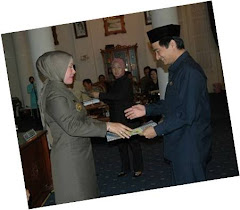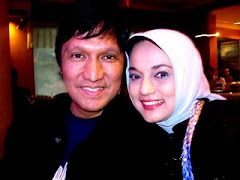

The Jakarta Post [ Wed, 08/04/2010]
Sumber: http://www.sunan-ampel.ac.id/index.php?option=com_content&view=article&id=755%3Aproblems-in-womens-involvement-in-politics&catid=74%3Apolitik&lang=in&Itemid=69
Nowadays, more women are involved in politics. Several legislative members are women, such as Rieke Diah Pitaloka, Angelina Sondakh and Nurul Arifin. Ratu Atut Chosiyah is even in her second term as Governor of Banten province.
Recently, Australia has also inaugurated Julia Gillard as Prime Minister to replace Kevin Rudd. Angela Merkel is in her second term as Chancellor of Germany.
In the United States, currently, several candidates for senators and governors are women such as Meg Whitman, Nikki Halley, Carly Fiorina and Sharron Angle.
Sarah Palin, former vice presidential candidate in the 2008 election, has been expected to be one potential candidate to run for president in 2012.
Actually, the current involvement of women in politics is not new. Indonesia had a woman president, Megawati Soekarnoputri. The United States has several women political figures that influence American politics and international relations such as Madeleine Albright and Hillary Clinton. Clinton, a former senator and first lady, replaces Albright’s position as Secretary of State a decade later.
What has been interesting recently is women’s active role in politics to analyze what factors might trigger women to engage more in politics by comparing the United States and Indonesia.
Specifically, this article will address the question about the current social and political circumstances that influence women to gain momentum to engage in politics both in the United States and Indonesia.
In the United States, anti-incumbent and anti-liberals are raising. When Americans elected President Obama in 2008, they hoped that change would come soon.
However, many Americans are still struggling to bounce back from the current economic crisis and many are still unemployed.
In addition, the federal budget deficits, immigration reform, and the implementation of Healthcare Bill are still challenging the Obama administration.
Thus, people are looking at new faces such as young people and women as a new alternative for speeding up changes. The recently elected senator from Massachussets, Scott Brown, who replaces the seat of the late Senator Kennedy and the loss of several Senate seats in the Democratic Party side, has proved that the anti-incumbent has been rising.
Along with the above problems, conservatism is stronger as a result of an opposition to several government’s policies allegedly serve liberal agendas of the Democratic Party.
The raising conservatism is marked, for example, by the emergence of the Tea Party movement and the raise of conservative groups and leaders.
Furthermore, several candidates who pursue public offices and senators are from conservatives and endorsed by the Tea Party Movement, such as Sharron Angle, a woman candidate for Senate from Nevada.
The social and political contexts in Indonesia are quite different from the US. Recently, the tendency to be known as a progressive or modern party is rising.
One of the signs of being progressive is by picking up female candidates. On the one hand this represents women’s voices since half the voters are women.
On the other hand, it is also to fulfill the mandate of Indonesian new election law, which requires parties to include 30 percent women in their nominated candidates for legislative members.
Preferring woman candidates can also be seen as a strategy to win electoral votes because women are more attractive and popular and sometimes are tied to those who have power and money.
Even though the insertion of women seems to be a lip service, this political system still benefit women since they get more chance to be active in politics. The partnership between Taufik Nuriman (Prosperous Justice Party or PKS) and Ratu Tatu Chasanah (Golkar Party) in the Serang regency election, Banten, seems to prove this argument.
Other examples of women who intend to run for public offices are more supported by their popularity and attractiveness than their quality of programs such as Julia Perez, Ayu Azhari and Venna Melinda.
When it comes to the issue of merit or qualification of a candidate, the two countries are different. In the United States, women candidates have better quality and better programs to run for Senate seats and public offices, such as Hillary Clinton, a former Senator; and Nancy Pelosi, a current House Speaker.
In Indonesia, the involvement of women in politics is still fulfilling quantity or quota as a result of an affirmative action. Therefore, although more women right now serve in office or the House of Representatives, they are not necessarily an advocate for women’s needs and rights.
To conclude, we hope that women who are active in Indonesian politics are not only because they are women, but also because they are capable in handling the country or region’s problems and are among the best candidates.
Therefore, the demand for having more female candidates should be followed by a willingness to improve women’s skill and capacity through education and empowerment.
The writer is an International Ford Foundation Fellow and a doctoral student at the School of Social Work, the University of Texas at Austin.




















